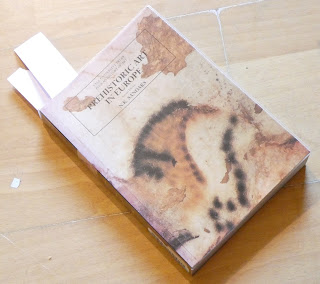A Shaman's Wanderings

Following on from my earlier post , this was delivered earlier today (48 hour service!): NK Sandars - Prehistoric Art in Europe and after a lunchtime's worth of browsing, it has already pushed the visual side of this project in a whole new direction. Sanders' scholarship might be 60+ years old but it covers so much more than processes of dating and archaeological musings - the clue is in the title, and she addresses the ideas of these works as art in their own right as well, citing the likes of Gombrich on the way, as well as several detailed comparisons of prehistoric figuration to so-called 'civilised' Greek artistic forms. In terms of visual interest, a few beast/human hybrids caught my attention straight away: especially the 'sorceror' (beast-shaman?) figure at bottom right. This straightaway inspired a more 'primitive' rendering of this depiction of Hrefni, the raven storm-god: as this, re-imagined in a much earlier style: Herein the difference is ...
